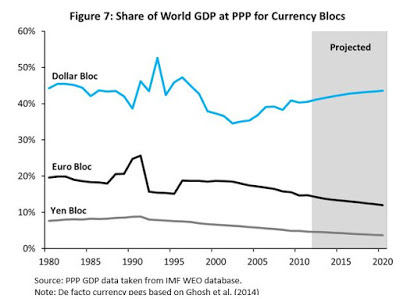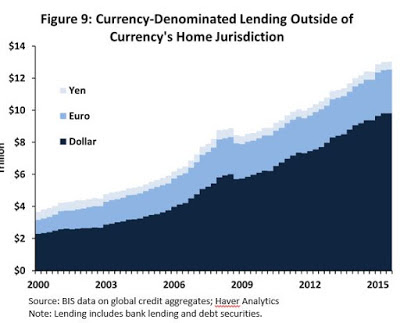The Merriam-Webster online dictionary defines uncertain as “not definitely known.” Before Thursday, the existence of the EU, the second largest trading block on the planet, was a certainty of international economics. That is no longer the case.
On Thursday, the UK voted to leave the EU, which could be the first of several referendums held by EU countries on their respective EU membership. After the UK's results were published, the head of France’s nationalist party tweeted out her approval of the vote, followed by a statement that France should have a similar referendum.
Other commentators argued the Netherlands or Italy may have a similar plebiscite. In response to the UK’s results, world stock markets tanked and bond markets rallied. Perhaps the only good thing in this situation is there was only one trading day after the vote, allowing traders to assess the situation over the weekend and hopefully develop a more rational approach over the weekend. But don’t be surprised if we have at least a few more weeks of extremely volatile trading as portfolio managers reallocate assets to align with the new reality.
The timing couldn’t be worse. Global growth was already slowing, as recently noted by the IMF in their Spring Report titled, “Too Slow for Too Long:”
The global recovery has weakened further amid increasing financial turbulence. Activity softened toward the end of 2015 in advanced economies, and stresses in several large emerging market economies showed no signs of abating. Adding to these headwinds are concerns about the global impact of the unwinding of prior excesses in China’s economy as it transitions to a more balanced growth path after a decade of strong credit and investment growth, along with signs of distress in other large emerging markets, including from falling commodity prices. With heightened risk aversion and increasing concerns about the lack of policy space, the valuation of risky assets as well as oil prices dropped sharply in early 2016. However, market sentiment began to improve in mid-February, and by the end of March market valuations had recovered most of or all the ground lost earlier in the year.
Russia and Brazil are still in a deep recession; China is rebalancing, which is slowing emerging economies, Abebomics is not having the intended affect in Japan, Canada is emerging from the negative impact of oil’s price slide, and the EU is still growing slowly. And now, the world economy faces the prospect of its largest trading block starting to splinter.
Will the Vote Lead to a British Recession?
Before the election, the UK economy was on fairly decent footing, with GDP growth at about 2% and unemployment at 5%:
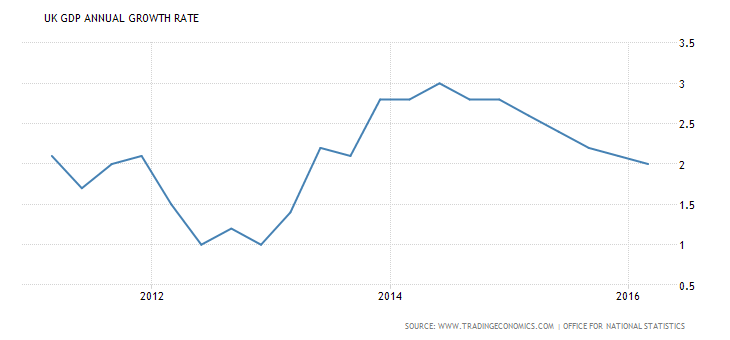
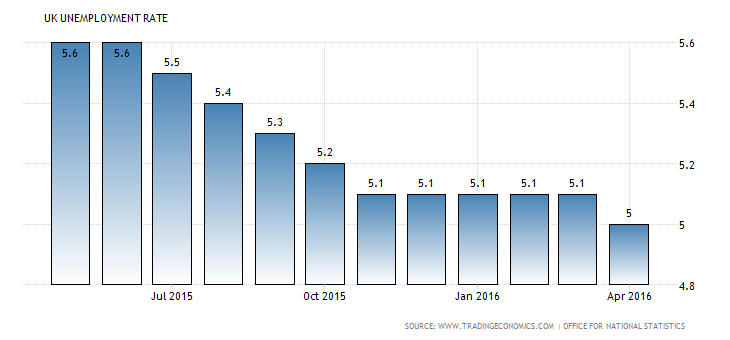
But even before the vote, businesses were putting plans on hold. The latest Markit manufacturing number was 50.1 -- just barely positive. And all new orders came from domestic contracts; export orders declined for the fifth consecutive month. Moreover, the Brexit vote was hurting business:
According to a special question added to the survey this month, over a third of respondents have seen a detrimental impact on their business from uncertainty regarding the forthcoming vote, within which 8% indicated that the impact was ‘strongly detrimental’. Further details are provided in the research note following this press release.
While the service number was at its lowest point in 38 months, it was still a positive 53.5. However, new orders were at their lowest in 41 months. The Brexit vote was slightly less negative on the service sector, although it was still clearly having an impact:
In a special question added to the May survey, companies were asked to comment on the impact on their current business of the issue of the UK’s potential exit from the EU. Around 28% of service providers reported a detrimental overall impact, and a further 9% stated a ‘strongly detrimental’ effect. However, 51% reported that they had so far been unaffected (further details are provided in the research note accompanying this release).
Construction activity was positive but subdued with a 51.2 reading. But there too, we see the negative impact of the Brexit vote:
May data signalled an outright reduction in new order volumes for the first time since April 2013. Anecdotal evidence pointed to a general lack of client confidence, driven by heightened uncertainty about the economic outlook. Moreover, a number of firms noted reluctance among clients to place orders and commence contracts until after the EU referendum.
According to a special question added to the survey this month, around one-third of respondents have seen a detrimental impact on their business from uncertainty regarding the forthcoming vote. Further details are provided in the research note following this press release.
The negative impact caused by increasing uncertainly will only grow worse. For example, half of the UK's exports go to the EU. While UK-EU trade is still governed by the EU treaty (and will be for 2 years beginning when the UK activates Article 50 of the EU treaty), what will happen after the expiration of that period? What rules will apply?
No one knows, which creates a huge problem for any contract over 2 years. And regarding the future terms of trade, consider that the EU has the added desire to punish the UK for leaving in order to send a signal to other countries who may think about leaving. And what about non-UK companies who formed a London subsidiary to gain access to the EU market?
They also have to answer numerous difficult questions before they can move forward. Finally, before the vote London was clearly vying to become a center of international finance, which was greatly aided by its then easy access to the second largest economic market on the planet. That is no longer the case. Jamie Dimon has already stated his company will have to shed London jobs as a result of this vote. His company will not be the only one.
What About the Impact on the EU?
The EU was beginning to do fairly well: GDP growth was increasing, industrial production was rising and business was expanding:
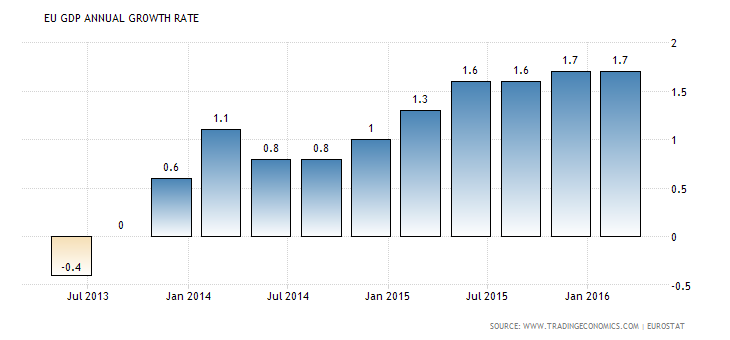
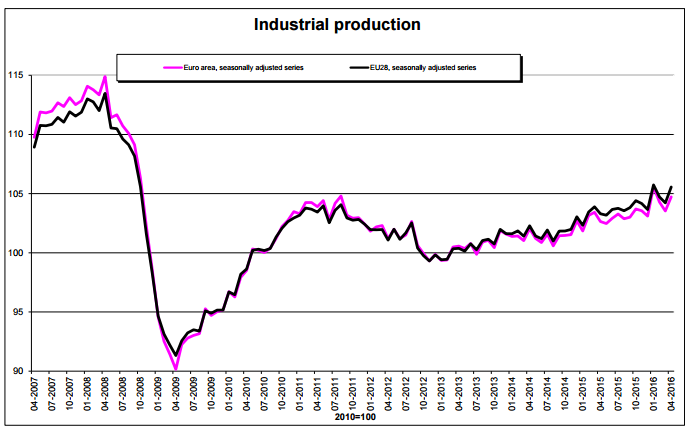
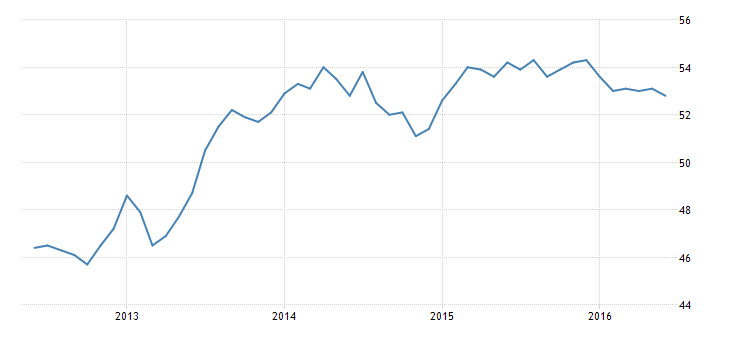
While there were obviously some problems – such as a still painfully high unemployment rate – the economy was clearly making progress. But how do you now do business there? Now that one country has left the block, expect others, such as those with a rising nationalist political class, to ask for their own vote. As of this writing, it’s possible we’ll see new votes in France and the Netherlands. If that happens, expect a continent wide recession caused by the mammoth rise in political uncertainty.
What About the US?
Just because the US is separated by an Ocean, don’t think we can’t be impacted. Increased international economic integration means no one is immune to the negative feedback loop. Fed President Lael Brainard elaborates:
The notable effects of recent crosscurrents from abroad should lay to rest any remaining lore that the United States is a closed economy. Financial linkages between the United States and foreign economies are immediate and extensive. Equity prices, long-term interest rates and risk spreads, and exchange rates show strong reactions to developments abroad, and, in recent months, foreign developments have at times been the dominant factor driving U.S. financial conditions. Weak foreign aggregate demand, as well as accompanying accommodative monetary policies in the euro area and Japan, and diverging expectations have been key among the factors causing a significant 10 percent appreciation of the dollar since last June. To the extent that exchange rate appreciation exerts a tightening force on financial conditions in the United States, it delays the return of U.S. interest rates to more normal levels.
While trade is a smaller share of the U.S. economy than in many other economies, exchange rate changes of the magnitude seen recently can have large effects on aggregate demand. We have already seen a large negative contribution of net exports to U.S. GDP growth in the past two quarters. In addition, because some models estimate that exchange rates’ effect on net exports can last up to three years, it is possible that the drag from net exports will persist for some time. Even before the latest estimate of the first-quarter contribution of net exports to GDP was published, many private-sector forecasters (as well as the Congressional Budget Office) expected net exports to subtract from GDP growth this year and next.
Brainard describes several transmission mechanisms through which Brexit will enter into the US economy, starting with equity valuations. While it’s easy to fall back on the tired phrase that the stock market is not the economy, that’s not entirely the case. First all, the S&P 500 is a component of the leading economic indicators. But far more importantly, it is also a component of our national economic psyche; it acts as a barometer giving the public cues about the status of the domestic economy. A bull market tells the public that the economy is growing while a bear market signals a contraction. In the former environment, consumers and entrepreneurs are more likely to take risk, increasing economic growth while in the latter risk taking behavior decreases, slowing growth. Fridays’ massive sell-off, which was so large that it was even reported on political blogs, tells the public that the vote was clearly a negative development. Sentiment will be depressed if the sell-off continues.
While the stock market affects sentiment, the dollars value impacts a far wider swath of statistics. Brainard notes the obvious result that a strong dollar translates into weaker exports. But as Menzie Chinn has noted, weaker trade also means lower manufacturing employment as shown in this chart:
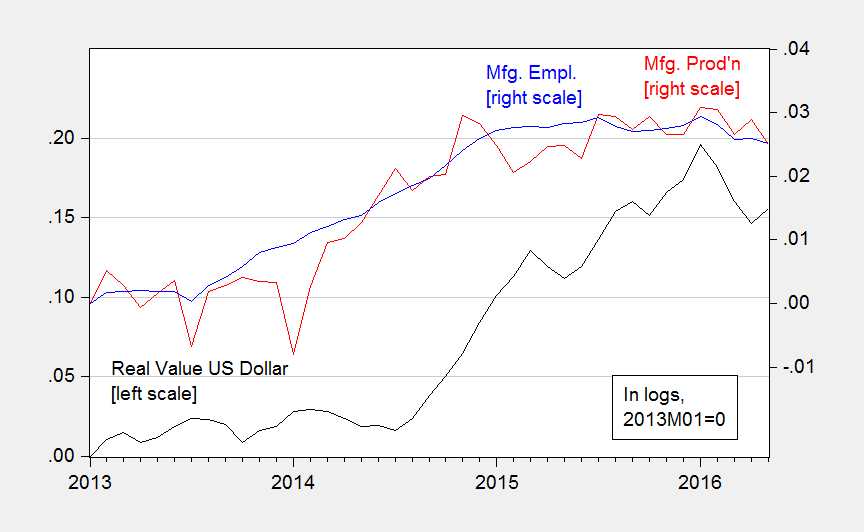
There are sufficient indirect channels through which Brexit will bleed into the US to harm growth to at least a moderate degree.
What about the Rest of the World?
The U.S. is not the only country negatively affected by an increase in the dollar. The blog Macro and Other Market Musings notes, over 40% of the world bases their currency’s value on the dollar, meaning their currency moves in lockstep with the dollar:
For those countries that are net exporters, expect a decline in trade and hence GDP. And since 2000, the amount of dollar denominated lending occurring outside the currency’s home jurisdiction has sharply increased:
This is where the real problem could potentially emerge. Because the dollar is a safe haven asset, it should rise as a result of the vote. And the higher its value, the greater the negative impact on countries that base their currency on the dollar.
Conclusion
To review:
- British uncertainty just skyrocketed, depressing any major or minor plans until the UK and the EU at least start their divorce. Don’t be surprised to see a shallow UK recession in the next 12-18 months.
- The EU proposition just became more uncertain. Spain has an upcoming election while France and Germany go to the polls next year.
- The US may import weakness through two channels: a declining stock market, which could lower sentiment, and a strengthening dollar, which will lower exports and decrease export-related employment.
- The dollar block – countries that base the value of their currency directly on the dollar, will have the same negative ramifications outlined in #3.
Notice there are no good conclusions from this list. That’s because none exist.Increased integration increases trade, which is a net boost to overall GDP. This move potentially decreases trade and greatly increases uncertainty at a time when the world economy was already slowing.
This is a colossal economic blunder of epic proportions.

